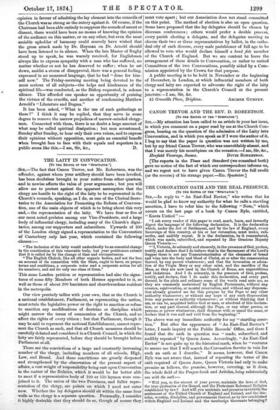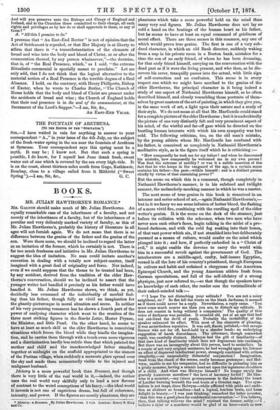THE CORONATION OATH AND THE REAL PRESENCE.
[TO THE Boma OF THE "SPECTATOR:']
SIR,—In reply to " An East-End Rector," who writes that he would be glad to know my authority for what he calls a startling assertion, I have to refer him to the following " Note," which occurs on the last page of a book by Canon Ryle, entitled, " Knots Untied" :—
"I ask every reader of this paper to read, mark, learn, and inwardly digest the language-of the following declaration. It is the declaration which, under the Act of Settlement, and by the law of England, every Sovereign of this country, at his or her coronation, must make, sub- scribe, and audibly repeat. It is the declaration, be it remembered, which was made, subscribed, and repeated by Her Gracious Majesty Queen Victoria :— " Victoria, do solemnly and sincerely, in the presence of God, profess, testify, and declare that I do believe that in the Sacrament of the Lord's Supper there is not any Transubstantiation of the elements of bread and wine into the body and blood of Christ, at or after the consecration thereof, by any person whatsoever ; and that the invocation or adora- tion of the Virgin Mary or any other saint, and the sacrifice of the Mass, as they are now used in the Church of Rome, are superstitious and idolatrous. And I do solemnly, in the presence of God, profess, testify, and declare, that I do make this declaration, and every part thereof, in the plain and ordinary sense of the words read unto me, as they are commonly understood by English Protestants, without any evasion, equivocation, or mental reservation' and without any dispensa- tion already granted me for this purpose by the Pope or any other authority whatsoever ; or without any hope of any such dispensation from any person or authority whatsoever ; or without thinking that I am, or can be, acquitted before God or man, or absolved of this declara- tion, or any part thereof, although the Pope, or any other person, or persons, or power whatsoever, shall dispense with or annul the same, or declare that it was null and void from the beginning.' " The above was my immediate authority for my " startling asser- tion." But after the appearance of " An East-End Rector's " letter, I made inquiry at the Public Records' Office, and there I found that the oath in question was " made, subscribed, and audibly repeated" by Queen Anne. Accordingly, "An East-End Rector" is not quite up to the historical mark, when he "ventures to assure me that I will search the Coronation Service in vain for such an oath as I describe." It seems, however, that Canon Ryle was not aware that, instead of repeating the terms of the oath required of Queen Anne, Queen Victoria had only to make promise as follows, the promise, however, covering, as it does, the whole field of the Prayer-book and Articles, being substantially one with the oath:— " Will you, to the utmost of your power, maintain the laws of God, the true profession of the Gospel, and the Protestant Reformed Religion established by law? And will you maintain and preserve inviolably the settlement of the United Church of England and Ireland, and the doc- trine, worship, discipline, and government thereof, as by law established within England and Ireland and the territories thereunto belonging?
And will you preserve unto the Bishops and Clergy of England and Ireland, and to the Churches there committed to their charge, all such rights
?and privileges as by law do or shall appertain to them, or any of them" A. "All this I promise to do."
I presume that " An East-End Rector " is not of opinion that the Act of Settlement is repealed, or that Her Majesty is at liberty to affirm that there is " a transubstantiation of the elements of bread and wine into the body and blood of Christ, at or after the consecration thereof, by any person whatsoever,"—the doctrine, that is, of "the Real Presence, which," as I said, "the extreme Ritualistic ceremonial is specially meant to proclaim." Let me only add, that I do not think that the logical alternative to the material notion of a Real Presence is the terrible dogma of a Real Absence. I hold, on the contrary, with Henry Phillpotts, Bishop of Exeter, when he wrote to Charles Butler, " The Church of Rome holds that the body and blood of Christ are present under the accidents of bread and wine ; the Church of England holds that their real presence is in the soul of the communicant, at the Sacrament of the Lord's Supper."—I am, Sir, &c., AN EAST-END VICAR.



































 Previous page
Previous page